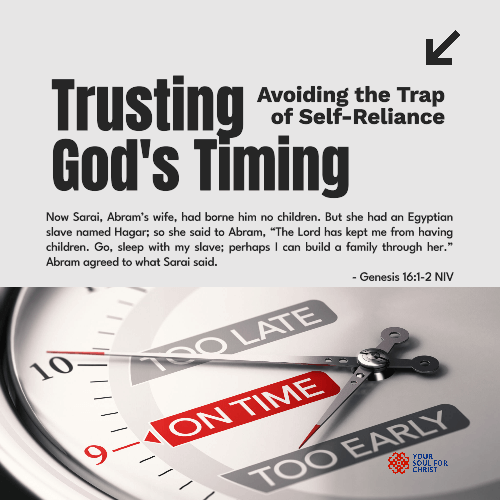Now Sarai, Abram’s wife, had borne him no children. But she had an Egyptian slave named Hagar; so she said to Abram, “The Lord has kept me from having children. Go, sleep with my slave; perhaps I can build a family through her.” Abram agreed to what Sarai said.
Genesis 16:1-2 NIV
In this passage, we encounter a profound lesson about trusting God’s timing. It tells the story of Sarai and Abram, who, in their impatience, took matters into their own hands instead of waiting on God’s perfect plan. Sarai’s decision to use Hagar as a surrogate and Abram’s agreement reveals the challenges of trusting God’s timing, especially when faced with uncertainty and delay. This story reminds us of the importance of relying on God’s promises rather than seeking shortcuts through human effort.
Sarai acknowledges, “The Lord has kept me from having children,” yet she does not seek the Lord for a solution. If she believed that God had withheld children, why didn’t she turn to Him in prayer? Instead, she devised her own plan. She relied on her effort rather than divine intervention.
Sarai’s approach is an example of self-reliance. She expressed her desire to build a family, saying, “Perhaps I can build a family through her.” Rather than trusting in God’s promise, she chose to use Hagar, her Egyptian slave, as a surrogate. They made this decision without consulting God. An example of misplaced focus on immediate results rather than faith in God’s providence.
While Sarai appears to be the primary initiator, Abram’s role is equally significant. Abram was the leader of the household and the recipient of God’s promise. He had the responsibility to seek God’s counsel. Instead, he agreed to Sarai’s plan without hesitation. This reveals another layer of human nature—our tendency to avoid accountability by shifting responsibility under the guise of another’s suggestion. Abram could have taken the matter back to God, especially since God had already assured him of offspring in Genesis 15.
Abram’s failure to pause and reflect is particularly surprising, given his earlier encounters with God. God had promised him descendants as numerous as the stars. However, when Sarai proposed using Hagar, Abram did not question whether this was God’s intended way. Perhaps Abram thought this plan aligned with God’s promise. But he overlooked a crucial truth: God was fully aware of his marital situation and had already planned for the fulfilment of His promise through Sarai.
This story serves as a cautionary tale about the dangers of impatience and reliance on human wisdom over divine guidance. Both acted out of a desire to control their circumstances rather than trusting in God’s perfect timing and method.
Genesis 16:1–2 reveals how human impatience and self-reliance can lead us astray, even when we have clear promises from God. Sarai and Abram’s choices demonstrate the consequences of taking matters into our own hands instead of seeking God’s will. This account reminds us that God’s promises are never dependent on our manipulation or shortcuts; they are fulfilled in His time and His way.
As we navigate our own challenges, let this story inspire us. We should learn to seek God in prayer, trust His timing, and rely on His wisdom rather than our own. True faith waits on the Lord, even when the waiting feels difficult.
